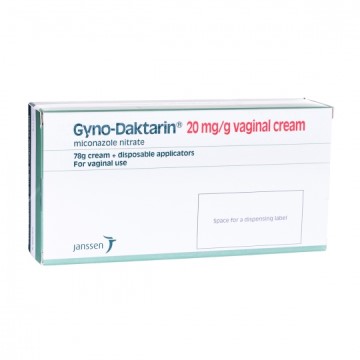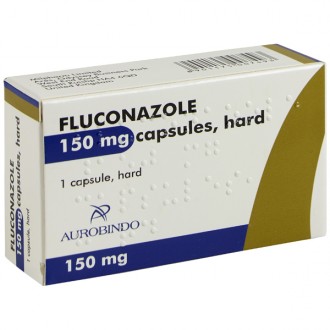Online Doctor
Thrush
Thrush is a common yet often misunderstood condition. It's caused by a type of yeast called Candida albicans and it can affect the mouth or genitals, typically caused by disruption to the body, usually by antibiotics.
Vaginal thrush isn't just uncomfortable, it's a signal that your body requires both attention and care. At Pharmacy Online, we understand the nuances of thrush treatment, offering a range of medications to treat the infection, including vaginal creams and thrush treatment tablets.
Whether you're experiencing thrush for the the first time or seeking a reliable solution for recurrent thrush, our team of pharmacists and medical professionals are here to help.
What is thrush?
Thrush, known medically as candidiasis, is a vaginal yeast infection caused by a fungus named Candida, often the Candida albicans species. This fungus is a normal part of your body's environment, residing harmlessly in areas like your mouth, gut, and vagina. However, under certain conditions, it can grow excessively, resulting in an infection.
For women, vaginal thrush is recognised by symptoms such as itching, redness, and a noticeable discharge like cottage cheese, which can be uncomfortable and disrupt your daily life. It's crucial to understand that thrush is not an indication of poor personal hygiene nor is it a sexually transmitted disease. It's a common health issue many women face. Early recognition of symptoms and seeking appropriate treatment can lead to quicker relief and less discomfort.
Triggers and causes of vaginal thrush
Understanding what leads to thrush can be key to managing and preventing it. While Candida naturally exists in your body, certain factors can trigger its overgrowth, leading to an infection. Some common triggers and causes you should be aware of include:
- Tight clothing: Wearing tight, synthetic clothing can create a warm, moist environment, which is ideal for yeast to thrive.
- Hormonal changes: Women often experience thrush during times of hormonal fluctuations such as during pregnancy, menstruation, or when using hormonal contraceptives.
- Antibiotics: While they're essential for treating bacterial infections, antibiotics can also disrupt the natural balance of bacteria and yeast in your body, sometimes resulting in thrush.
- Weakened immune system: If your immune system is compromised, whether due to illness, stress, or certain medications, you may be more susceptible to thrush.
- Diabetes: If you have diabetes, particularly when it's not well-controlled, the higher sugar levels in your saliva, urine, and genital area can encourage yeast growth.
- Sexual activity: While thrush is not classified as a sexually transmitted infection, it can sometimes be passed between partners during sexual activity.
What else presents with thrush symptoms?
If you're experiencing symptoms of thrush, don't rush into assuming that's what it is, it's important to consider other conditions that might present similarly. Here's what else your symptoms could be pointing to:
Bacterial Vaginosis (BV): Like thrush, BV causes vaginal discharge and discomfort. However, the discharge in BV often has a fishy odour and is more watery than the thicker discharge typical of thrush.
Sexually Transmitted Infections (STIs): Certain STIs, such as chlamydia or gonorrhea, can mimic the symptoms of thrush, including discomfort and unusual discharge. If you've noticed vaginal irritation, err on the side of caution and take a trip to the sexual health clinic.
Skin conditions: Skin issues, such as eczema or dermatitis, can cause itching and irritation in the genital area, which can be mistaken for thrush.
Urinary Tract Infections (UTIs): While UTIs typically cause symptoms like burning during urination, they can also lead to irritation that could be confused with thrush.
Understanding the differences is key because each of these conditions requires a different treatment approach. If you're uncertain or your symptoms persist, it's important to consult a healthcare professional for an accurate diagnosis. Speak with a member of our team today, and they'll help you get the appropriate treatment.
Common thrush symptoms
Recognising vaginal thrush symptoms is the first step towards getting the right treatment. Some common signs you might experience if you have thrush include:
- Pain during intercourse: Thrush can make sexual intercourse painful, a symptom that shouldn't be ignored.
- Swelling and redness: The affected area may become swollen and red, indicating inflammation.
- Itching and irritation: One of the most noticeable symptoms is itching around the vagina and vulva. This can range from mild to severe.
- White, cottage cheese-like discharge: While some vaginal discharge is normal, thrush often causes a white, thick discharge that may resemble cottage cheese.
- Burning sensation while urinating: A burning feeling during urination can also be a sign of thrush, although it's more commonly associated with urinary tract infections.
If you're experiencing these symptoms, remember they can vary in intensity. Some women might have a mild case with only slight discomfort, while others might experience more severe and bothersome symptoms.
It's important to listen to your body. If these symptoms are causing discomfort, seek advice from a healthcare professional to confirm whether it's thrush and get you on the best course of treatment.
Diagnosing thrush
If you're experiencing symptoms of thrush, getting your thrush diagnosed is essential for effective treatment, especially if it's your first time experiencing these symptoms or if over-the-counter treatments haven't worked.
Your doctor will start by asking about your symptoms and medical history. This initial conversation is crucial to understand your situation better.
If necessary, they'll carry out a physical examination of the affected area to observe any visible signs of thrush, such as redness, swelling, or discharge.
In some cases, especially if your symptoms are severe or you suffer with recurrent thrush, your doctor might take a small sample of the discharge. This sample can be tested in a lab to confirm the presence of the Candida fungus.
If you're experiencing recurrent episodes of thrush, further tests might be recommended to rule out underlying health issues, like diabetes or a weakened immune system.
Thrush treatments
Pharmacy Online offers a range of effective medications to treat thrush. These include:
- Canesten thrush pessary with applicator: A convenient treatment option, this method delivers medication directly to the affected area. It's particularly useful if you prefer not to use oral medication.
- Gyno-daktarin: Gyno-daktarin is an antifungal vaginal cream that alleviates the symptoms of thrush infection. It's suitable for females aged 18 and over and contains the active ingredient miconazole nitrate (an antifungal).
- Fluconazole:Fluconazole is a common oral antifungal medication that works by stopping the growth of yeast. It's often taken as a single dose and is effective for mild to moderate vaginal infection symptoms.
- Clotrimazole: Available as a cream or a pessary (a tablet you insert into the vagina), this treatment contains the active ingredient clotrimazole which targets the yeast infections directly, providing relief from itching and discomfort.
- Combination Canesten treatment packs: These packs include both oral tablets and external thrush creams, offering a comprehensive approach to tackle the infection from both inside and outside.
Remember, while these thrush treatments available at Pharmacy Online can be effective, it's important to consult a healthcare professional for a proper diagnosis and treatment plan, especially if you're experiencing recurring thrush.
Gyno-daktarin Out of stock
From £17.99Fluconazole In stock
From £4.99
FAQ
What helps thrush clear quickly?
If you're dealing with thrush and want quick relief, using antifungal treatments like Fluconazole, which is a one-time oral pill, or Clotrimazole, a cream or vaginal tablet, can really help. These treatments work fast to stop the yeast causing your discomfort. Also, keeping the area clean and dry and steering clear of irritants can speed up your healing. But remember, it's always a good idea to check with a healthcare professional for the best treatment for you.
Can thrush clear up on its own?
Yes, thrush can sometimes clear up on its own, especially if it's mild. Your body's natural defenses might manage to restore the balance between yeast and bacteria. However, if you're finding the symptoms uncomfortable or they're not improving, consider treatment. Using over-the-counter antifungal medications can speed up recovery and ease discomfort. If symptoms persist, it's important to consult a healthcare professional for advice.
Can I prevent yeast infections like thrush?
Absolutely, there are several steps you can take to prevent yeast infections like thrush. Keep your genital area clean and dry, and opt for breathable, cotton underwear. Avoid using scented products down there, like soaps or sprays. Eating a balanced diet and reducing sugar intake can also help. Probiotics, found in yogurt or supplements, can support a healthy balance of bacteria. These simple changes can make a big difference in preventing thrush.
Does drinking lots of water help get rid of thrush?
Drinking plenty of water is always beneficial for your overall health, and it can aid in managing thrush too. Staying hydrated helps flush out toxins and maintain the natural balance in your body, including in areas prone to yeast infections. While water alone might not cure thrush, it supports your body's healing process and, when combined with appropriate treatment, can contribute to quicker recovery from the infection.
Can I use Sudocrem for thrush?
Sudocrem isn't the best choice for treating thrush. It's great for nappy rash, but thrush needs something different. If you've got thrush, you're better off using specific antifungal creams or pills like Clotrimazole or Fluconazole. They directly target the yeast infection. Sudocrem might help with the sore skin around the area, but it won't get rid of the thrush itself. For the most effective treatment, stick to products made for thrush.
Is it better not to shower when you have thrush?
Actually, showering is good when you have thrush. It helps keep the affected area clean and prevents further irritation. Just remember to use mild, unscented soap and avoid douching, as this can disrupt the natural balance in your vagina. After showering, gently pat the area dry, as moisture can encourage yeast growth. Keeping the area clean and dry is key to helping your body recover from thrush.
How long does vaginal thrush last?
Vaginal thrush typically lasts about one to two weeks with proper treatment. If you're using over-the-counter antifungal medications, you should start seeing improvement within a few days. However, if your symptoms don't start to get better after a week or so, it's a good idea to check with a healthcare professional. Sometimes, if thrush is more stubborn or recurrent, you might need a different treatment approach.
Can cranberry juice help thrush?
Cranberry juice is often mentioned for urinary tract health, but it's not a go-to solution for thrush. It doesn't have the properties needed to combat the yeast causing thrush. For effective relief, antifungal thrush treatments are your best bet. However, cranberry juice can be part of a healthy diet, and staying hydrated is always good for your overall health. Just remember, for treating thrush specifically, it's better to stick with recommended medications.
Causes
Thrush can be caused by antibiotic use, which can disrupt the function of other bacteria in the body. Yeast typically lives in the body; however, antibiotics can cause the yeast to develop into an infection. You should continue to take antibiotics as prescribed if you develop thrush; however, you should inform your GP.
Thrush is not a sexually transmitted infection; however, it can be passed during sexual activity. Avoid any sexual contact during an outbreak of thrush until it has cleared.
Treatments
Thrush can easily be treated using oral antifungals and creams. These are available to purchase here at Pharmacy Online, so please get in contact with a member of our team to discuss treatment options.
Symptoms
Thrush can occur in the mouth or on the genitals. Oral thrush typically presents as a white coating on the tongue, soreness in the mouth, and an unpleasant taste.
Genital thrush can cause irritation and itching on the genitals. It can be made worse by tight-fitting clothes, excessive sweating, or scented soap products.







